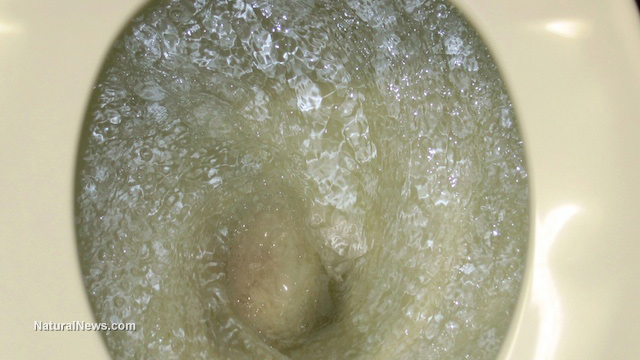World Toilet Day highlights importance of sanitation in overcoming diseases like Ebola
Wednesday, December 03, 2014 by: Jonathan Benson, staff writer
Tags: World Toilet Day, sanitation, Ebola

- Gardening tips: 15 Simple tricks to double your garden’s yield this season
- TAKE IT DOWN Act advances in Congress amid free speech concerns
- Survival 101: Dangerous places to avoid when disaster strikes
- Nature’s arsenal: How plant compounds power military survival and healthcare in crisis
- Kawasaki unveils rideable ROBOT HORSE powered by hydrogen
- Amazon's Kuiper satellite launch delay highlights uphill battle against Musk's Starlink
- DOJ and ATF kill Biden’s “Zero Tolerance” firearms dealer policy
- Criminal referral requests filed against Fauci and top COVID officials in seven states
- “Prepare Tribe: Prepare, Protect, Provide” on BrightU: How to build a disaster-proof shelter in the middle of nowhere
- Barley: A nutrient-dense ancient grain with modern benefits
- Hospital staffers sound alarm after 10 nurses were diagnosed with BRAIN TUMORS
- Germany prepares students for war amid growing security concerns
- Rafael Medoff explores the role of Jabotinsky in the rise of Revisionist Zionism in “Militant Zionism in America”
- New studies ignite debate: Fluoride linked to autism and ADHD, prompting calls for policy reassessment
- Yoga and autism: A science-backed look at how a simple practice is transforming behavior and movement in children with ASD
- POLL: U.S. support for Israel drops to lowest level in decades amid Gaza War
- Trump escalates tariffs to 145% on Chinese goods amid fentanyl crisis, escalating trade tensions
- Study reveals social media’s stealthy role in the childhood OBESITY crisis
- Tulsi Gabbard leads charge against the Biden regime’s global censorship of the 'Disinformation Dozen'
- Fauci is back in the limelight, and he’s busy promoting a future COVID or FLU pandemic
- Aerosolized bioweapons? Strange “diploid biomasses” falling out of the sky in Florida captured under the microscope
- Analysis: The coming economic collapse, a mass uprising and Trump's three secret weapons to halt the growing revolt
- Widespread social and economic unrest: Steve Quayle issues urgent financial warning of imminent asset collapse in new interview with Mike Adams
- Kiss Your Genetic Privacy Good-Bye! 23andMe Gets Green Light to Sell Your Intimate Genetic Details to Anyone They Want
- Tulsi Gabbard takes aim at censorship: Justice for the ‘Disinformation Dozen’
- Mike Adams releases country western hit single: Goin’ Back in Time is Comin’ Home
- U.S. lawmakers investigate Meta over alleged China collaboration
- CLOT SHOT PLANDEMIC UNFOLDING: Fibrous, rubbery clots caused by covid injections have prion-like seeding activity
- Chemtrails unveiled: How the CIA and Big Business are manipulating the weather for profit
- How Israeli military-connected corporations are secretly controlling your online privacy
- European Court of Justice: Healthcare professionals who promoted or administered COVID-19 vaccines are CRIMINALLY LIABLE for any harm caused
- DEATH by VACCINE or face PRISON time: Canadian Freedom Convoy leaders CONVICTED for protesting forced vaccination during the Covid Plandemic
- Defunding DEADLY mRNA jabs: Government funding for mRNA technology being scrutinized and sidelined until proven "safe and effective" for real
- Federal employees whine over DOGE's new directive requiring them to do a 5-point summary of weekly accomplishments
- U.S. approves new Russian ambassador as diplomatic thaw continues
- Curcumin’s ancient healing power supercharges muscle recovery, and its effects are compounded with anti-inflammatory foods and supplements
- Newly released JFK files reveal Pentagon's role in creating Lyme disease and covid in the same lab
- Analysis: The coming economic collapse, a mass uprising and Trump's three secret weapons to halt the growing revolt
- Mike Adams releases country western hit single: Goin’ Back in Time is Comin’ Home
- Aerosolized bioweapons? Strange “diploid biomasses” falling out of the sky in Florida captured under the microscope
- Kiss Your Genetic Privacy Good-Bye! 23andMe Gets Green Light to Sell Your Intimate Genetic Details to Anyone They Want
- Dr. Mike Yeadon releases 15-minute testimony - WATCH - about genocidal intent of COVID “vaccines”
- Trump reverses course on Gaza plan, says “nobody is expelling Palestinians”
- MEDICAL BOMBSHELL: FDA admits Covid mRNA 'Vaccines' CAUSE CANCER
- European Court of Justice: Healthcare professionals who promoted or administered COVID-19 vaccines are CRIMINALLY LIABLE for any harm caused
- The Health Ranger releases “Vaccine Zombie” song and music video, using AI-animated zombies for the music video
- 5 Simple steps to boost your brainpower: How to strengthen executive function in a distracted world
- A lack of integrity in Academia: Harvard professor found GUILTY of fraudulent research to promote CRT theory
- Federal employees whine over DOGE's new directive requiring them to do a 5-point summary of weekly accomplishments
- EPA advisor admits the agency is funneling billions to climate groups ahead of Trump’s return to White House
- California's social media censorship law struck down: A victory for free speech or a threat to online safety?
- Space war brewing? Russia threatens to destroy Starlink satellites
- Survival 101: Effective EMF blocking techniques
- Rep. Nancy Mace introduces bill to ban biological males from female facilities on federal property
- Red Cross issues warning to stop blood plasma donations from vaccinated people
- Scientists confirm: GENIUS brain function can be spontaneously unleashed in humans without any apparent cause
- EPA advisor admits the agency is funneling billions to climate groups ahead of Trump’s return to White House
- HYSSOP: What research reveals about the health benefits of this ancient holy herb
- Two containers with completed ballots fall out of truck in Florida
- Newly released JFK files reveal Pentagon's role in creating Lyme disease and covid in the same lab
- Global leaders unite to clamp down on “misinformation” with UN-backed Cascais Declaration
- BREAKING: 2025 NDAA authorizes mandatory military draft of WOMEN across America… as Pentagon pursues global NUCLEAR war with both Russia and China at the same time
- Michael Yon warns of a ZIONIST TAKEOVER in Trump’s second administration
- Ozempic and Wegovy weight loss drugs are injectable LIZARD VENOM PEPTIDES that may unleash a devastating wave of organ failure… side effects align with symptoms of SNAKE BITES
- The Health Ranger releases “Vaccine Zombie” song and music video, using AI-animated zombies for the music video
- Mike Adams releases country western hit single: Goin’ Back in Time is Comin’ Home
- BOMBSHELL: DNA testing kits are a SCAM to develop ethnic-specific bioweapons
- Israeli soldiers accused of even more torture and abuse in the West Bank
- These 13 countries just signed an agreement to engineer a global FAMINE by destroying food supply
- NASA admits that climate change occurs because of changes in Earth’s solar orbit, and NOT because of SUVs and fossil fuels
- Fully vaccinated about to see “tsunami” of illness and death, warns virologist
- RFK Jr. clears key hurdle: Sen. Susan Collins backs controversial HHS nominee, signaling a new era for health policy
According to the international agency, about 35 percent of the human population currently lacks access to toilets, and many of these same folks also suffer from constant exposure to contaminated drinking water, which often contains residues of human feces. This lack of basic sanitation increases the risk of disease spread, especially among younger children.
A report by the international development group WaterAid found that most of the deaths that occur among children under the age of five occur because toilets aren't available to them. More than 10 million children age five and under, in fact, have died since 2000 as a result of this, prompting elevated concern by global agencies.
"Where there is nowhere safe and clean to go to the toilet, people are exposed to disease, lack of privacy and indignity," explains WaterAid. "When communities defecate in the open, disease spreads fast and water sources are polluted."
Since 1990, more than 2.3 billion people have gained access to cleaner drinking water
Though the situation remains dire for many, there is some good news in all this. Between 1990 and 2012, about 2.3 billion people who previously didn't have access to clean drinking water gained access to it, according to UN-Water data. During that same time, childhood fatalities from diarrheal diseases dropped significantly in areas where sanitation improved.UN data show that, with these improvements in water quality, the number of deaths from diarrheal diseases dropped to nearly one-third of what it was previously. A study published in the peer-reviewed Lancet journal found that the number of deaths among children age four and younger fell from roughly 1.5 million prior to the improvements to 578,000.
"For every dollar invested in water and sanitation, there is a $4.3 return in the form of reduced health care costs for individuals and society around the world," explains a UN report. "International aid for water and sanitation is on the rise... financial commitments increased by 30 per cent between 2010 and 2012 -- from $8.3 billion to $10.9 billion."
Many still lack basic sanitation services, furthering spread of deadly diseases
But in those areas that still lack basic sanitation services, so-called "preventable deaths" are still rampant. According to WaterAid, as many as 508,000 children died last year as a result of not having basic cleanliness resources like soap and water to wash hands.In countries that lack these basic necessities, communicable diseases are much more likely to spread, just like they did during the earlier part of the 19th century in the U.S. in some areas. Though often attributed to the advent of vaccines, this massive reduction in preventable deaths in the West was the direct result of improved sanitation standards.
"Poor water, sanitation and hygiene conditions in communities and institutional settings, especially health facilities, exacerbated the spread of Ebola in West Africa," states a recent Bloomberg report.
Most of those suffering from a lack of basic sanitation resources aren't in Africa, as might be assumed, but rather in India, where 60 percent of the world's residents without toilets currently live. All this human waste ends up polluting groundwater, waterways and crops, leading to the rapid spread of infectious diseases like cholera and Ebola.
Sources for this article include:
http://www.bloomberg.com
http://www.wateraid.org
http://www.un.org
http://www.unwater.org
http://www.naturalnews.com
http://www.naturalnews.com
World Toilet Day at FETCH.news
Get independent news alerts on natural cures, food lab tests, cannabis medicine, science, robotics, drones, privacy and more.
Take Action: Support Natural News by linking to this article from your website
Permalink to this article:
Embed article link: (copy HTML code below):
Reprinting this article:
Non-commercial use OK, cite NaturalNews.com with clickable link.
Follow Natural News on Facebook, Twitter, Google Plus, and Pinterest
Science News & Studies
Medicine News and Information
Food News & Studies
Health News & Studies
Herbs News & Information
Pollution News & Studies
Cancer News & Studies
Climate News & Studies
Survival News & Information
Gear News & Information
News covering technology, stocks, hackers, and more



"Big Tech and mainstream media are constantly trying to silence the independent voices that dare to bring you the truth about toxic food ingredients, dangerous medications and the failed, fraudulent science of the profit-driven medical establishment.
Email is one of the best ways to make sure you stay informed, without the censorship of the tech giants (Google, Apple, Facebook, Twitter, YouTube, etc.). Stay informed and you'll even likely learn information that may help save your own life."
–The Health Ranger, Mike Adams













































